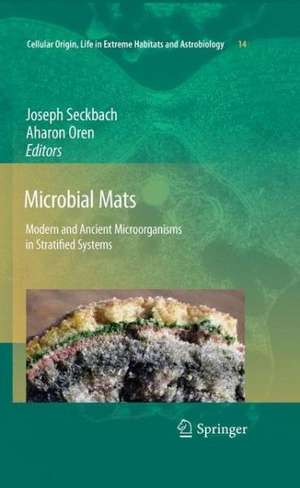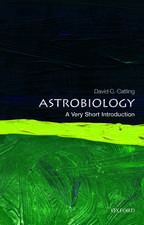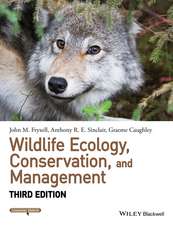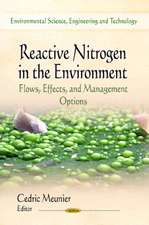Microbial Mats: Modern and Ancient Microorganisms in Stratified Systems: Cellular Origin, Life in Extreme Habitats and Astrobiology, cartea 14
Editat de Joseph Seckbach, Aharon Orenen Limba Engleză Paperback – 5 sep 2012
These mats are perfect models for biogeochemical processes, such as the cycles of chemical elements, in which a variety of microorganisms cooperate and interact in complex ways. They are often found under extreme conditions and their study contributes to our understanding of extremophilic life. Moreover, microbial mats are models for Precambrian stromatolites; the study of modern microbial mats may provide information on the processes that may have occurred on Earth when prokaryotic life began to spread.
| Toate formatele și edițiile | Preț | Express |
|---|---|---|
| Paperback (1) | 1232.26 lei 6-8 săpt. | |
| SPRINGER NETHERLANDS – 5 sep 2012 | 1232.26 lei 6-8 săpt. | |
| Hardback (1) | 1237.61 lei 6-8 săpt. | |
| SPRINGER NETHERLANDS – 11 iun 2010 | 1237.61 lei 6-8 săpt. |
Din seria Cellular Origin, Life in Extreme Habitats and Astrobiology
- 18%
 Preț: 1683.66 lei
Preț: 1683.66 lei - 5%
 Preț: 1440.04 lei
Preț: 1440.04 lei - 18%
 Preț: 1839.32 lei
Preț: 1839.32 lei - 18%
 Preț: 1848.33 lei
Preț: 1848.33 lei - 18%
 Preț: 1839.32 lei
Preț: 1839.32 lei - 18%
 Preț: 1222.27 lei
Preț: 1222.27 lei - 18%
 Preț: 2098.03 lei
Preț: 2098.03 lei - 18%
 Preț: 1228.29 lei
Preț: 1228.29 lei - 18%
 Preț: 2111.46 lei
Preț: 2111.46 lei - 24%
 Preț: 1076.36 lei
Preț: 1076.36 lei - 18%
 Preț: 1828.11 lei
Preț: 1828.11 lei - 18%
 Preț: 951.14 lei
Preț: 951.14 lei - 18%
 Preț: 1219.94 lei
Preț: 1219.94 lei - 18%
 Preț: 1235.08 lei
Preț: 1235.08 lei - 18%
 Preț: 1252.76 lei
Preț: 1252.76 lei - 18%
 Preț: 1263.01 lei
Preț: 1263.01 lei - 18%
 Preț: 956.50 lei
Preț: 956.50 lei - 18%
 Preț: 956.03 lei
Preț: 956.03 lei - 18%
 Preț: 1234.46 lei
Preț: 1234.46 lei - 18%
 Preț: 1122.58 lei
Preț: 1122.58 lei - 15%
 Preț: 646.11 lei
Preț: 646.11 lei - 18%
 Preț: 1840.91 lei
Preț: 1840.91 lei - 18%
 Preț: 1231.16 lei
Preț: 1231.16 lei - 18%
 Preț: 1251.50 lei
Preț: 1251.50 lei - 18%
 Preț: 961.41 lei
Preț: 961.41 lei
Preț: 1232.26 lei
Preț vechi: 1502.76 lei
-18% Nou
Puncte Express: 1848
Preț estimativ în valută:
235.79€ • 246.18$ • 195.15£
235.79€ • 246.18$ • 195.15£
Carte tipărită la comandă
Livrare economică 04-18 aprilie
Preluare comenzi: 021 569.72.76
Specificații
ISBN-13: 9789400732414
ISBN-10: 9400732414
Pagini: 632
Ilustrații: XXVI, 606 p.
Dimensiuni: 155 x 235 x 33 mm
Greutate: 0.86 kg
Ediția:2010
Editura: SPRINGER NETHERLANDS
Colecția Springer
Seria Cellular Origin, Life in Extreme Habitats and Astrobiology
Locul publicării:Dordrecht, Netherlands
ISBN-10: 9400732414
Pagini: 632
Ilustrații: XXVI, 606 p.
Dimensiuni: 155 x 235 x 33 mm
Greutate: 0.86 kg
Ediția:2010
Editura: SPRINGER NETHERLANDS
Colecția Springer
Seria Cellular Origin, Life in Extreme Habitats and Astrobiology
Locul publicării:Dordrecht, Netherlands
Public țintă
Professional/practitionerCuprins
The Nature of Microbial Mats.- What are Microbial Mats?.- Paper from Outer Space – on “Meteorpapier” and Microbial Mats.- Microbial Mats in The Geological Record.- Microbial Mats on the Early Earth: The Archean Rock Record.- Gunflint Chert Microbiota Revisited – Neither Stromatolites, Nor Cyanobacteria.- Paleoenvironmental Context of Microbial Mat-Related Structures in Siliciclastic Rocks.- Microbially Related Structures in Siliciclastic Sediment Resembling Ediacaran Fossils: Examples from India, Ancient and Modern.- Osmotrophic Biofilms: From Modern to Ancient.- Microbial Mats as a Source of Biosignatures.- Molecular Investigations and Experimental Manipulations of Microbial Mats: A View to Paleomicrobial Ecosystems.- Architecture of Archaeal-Dominated Microbial Mats from Cold Seeps in the Black Sea (Dnjepr Canyon, Lower Crimean Shelf).- Marine, Freshwater, and Soil Biofilms.- Biodynamics of Modern Marine Stromatolites.- Entophysalis Mats as Environmental Regulators.- Diversity and Role of Cyanobacteria and Aerobic Heterotrophic Microorganisms in Carbon Cycling in Arid Cyanobacterial Mats.- Ooid Accreting Diatom Communities from the Modern Marine Stromatolites at Highborne Cay, Bahamas.- Exopolymers (Extracellular Polymeric Substances) in Diatom-Dominated Marine Sediment Biofilms.- Microbial Mats from Wind Flats of the Southern Baltic Sea.- Diazotrophic Microbial Mats.- Architectures of Biocomplexity: Lichen-Dominated Soil Crusts and Mats.- Iron and Bacterial Biofilm Development.- Microbial Mats in Extreme Environments.- Mats of Filamentous and Unicellular Cyanobacteria in Hypersaline Environments.- Marine Hypersaline Microcoleus-Dominated Cyanobacterial Mats in the Saltern at Guerrero Negro, Baja California Sur, Mexico: A System-Level Perspective.-Environmental Dynamics, Community Structure and Function in a Hypersaline Microbial Mat.- Biogeochemistry of Carbon Cycling in Hypersaline Mats: Linking the Present to the Past through Biosignatures.- Phototrophic Biofilms from Río Tinto, an Extreme Acidic Environment, The Prokaryotic Component.- Fluvial Bedform Generation by Biofilm Activity in the Berrocal Segment of Río Tinto: Acidic Biofilms and Sedimentation.- Cyanobacterial Mats of the Meltwater Ponds on the McMurdo Ice Shelf (Antarctica).- Diversity and Ecology of Cyanobacterial Microflora of Antarctic Seepage Habitats: Comparison of King George Island, Shetland Islands, and James Ross Island, NW Weddell Sea, Antarctica.- Microbial Mats And Astrobiology.- Microbial Mats in Antarctica as Models for the Search of Life on the Jovian Moon Europa.- Past, Present, and Future: Microbial Mats as Models for Astrobiological Research.- Outlook and Summary.- Summary and Conclusions.
Recenzii
From the reviews:
“This volume encompasses many aspects of the microbial mats being a valuable source of information and a true working instrument for scientists interested in microbial mats, either beginners or already known in the field. … attract new people for the study of different aspects of microbial mats students or scientists from other domains. … the reader finds an excellent resume of the main ideas and topics of this comprehensive and authoritative book on microbial mats, which should be available in every decent scientific library.” (Ioan I. Ardelean, Romanian Biochemical Journal, Vol. 48 (1), 2011)
“This volume encompasses many aspects of the microbial mats being a valuable source of information and a true working instrument for scientists interested in microbial mats, either beginners or already known in the field. … attract new people for the study of different aspects of microbial mats students or scientists from other domains. … the reader finds an excellent resume of the main ideas and topics of this comprehensive and authoritative book on microbial mats, which should be available in every decent scientific library.” (Ioan I. Ardelean, Romanian Biochemical Journal, Vol. 48 (1), 2011)
Textul de pe ultima copertă
This book provides information about microbial mats, from early fossils to modern mats located in marine and terrestrial environments. Microbial mats – layered biofilms containing different types of cells – are most complex systems in which representatives of various groups of organisms are found together. Among them are cyanobacteria and eukaryotic phototrophs, aerobic heterotrophic and chemoautotrophic bacteria, protozoa, anoxygenic photosynthetic bacteria, and other types of microorganisms.
These mats are perfect models for biogeochemical processes, such as the cycles of chemical elements, in which a variety of microorganisms cooperate and interact in complex ways. They are often found under extreme conditions and their study contributes to our understanding of extremophilic life. Moreover, microbial mats are models for Precambrian stromatolites; the study of modern microbial mats may provide information on the processes that may have occurred on Earth when prokaryotic life began to spread.
These mats are perfect models for biogeochemical processes, such as the cycles of chemical elements, in which a variety of microorganisms cooperate and interact in complex ways. They are often found under extreme conditions and their study contributes to our understanding of extremophilic life. Moreover, microbial mats are models for Precambrian stromatolites; the study of modern microbial mats may provide information on the processes that may have occurred on Earth when prokaryotic life began to spread.
Caracteristici
This volume presents new information not published as yet Chapters have been contributed by experts of microbial mats The information in this book is aimed to a wide circle of readers There are no other recent publications to compete with this one Includes supplementary material: sn.pub/extras










